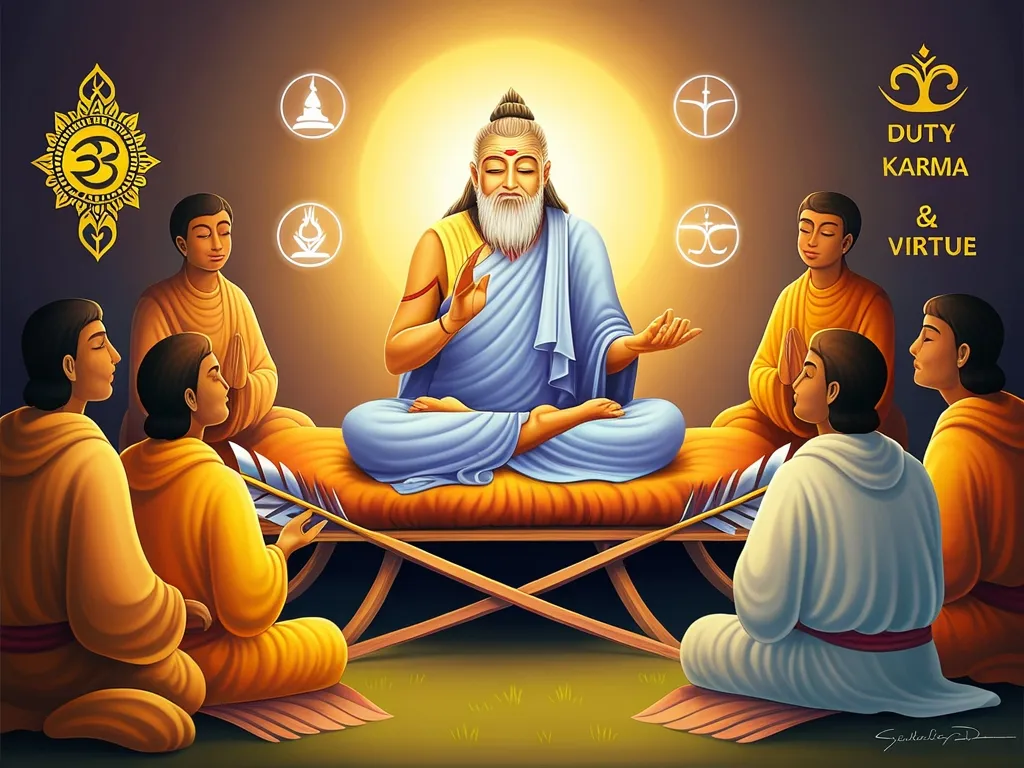In the vast treasure trove of ancient Indian epics, there’s a heartwarming story that really pulls at the heartstrings—it’s the tale of Ruru and Pramadvara. Their story is a powerful testament to the kind of love that doesn’t flinch even in the face of death, the kind of devotion that drives one to make unimaginable sacrifices.
Ruru, a sage from the prestigious lineage of Sage Bhrigu, had an impeccable reputation for his devout nature. His father, Pramati, was a descendant of Sage Bhrigu, making Ruru a part of a revered family of sages. Ruru’s life took a drastic turn on a fateful day when he went to the forest hermitage of Sage Sthulakesha. There, he encountered Pramadvara, a vision of beauty and grace, the adopted daughter of Sthulakesha. She was actually born of celestial parentage—an apsara named Menaka and Vishvavasu, the king of the Gandharvas—and had been raised by the sage after her mother left her.
As expected in any timeless love story, Ruru was instantly captivated by Pramadvara. Smitten doesn’t even begin to cover it. The guy was head over heels. Wanting to make things official, Ruru sought his father’s help to ask for her hand in marriage. Pramati, being the dutiful dad, met with Sthulakesha, and the proposal was set. Both families were delighted, and the wedding day was planned for when the star Varga-Daivata (Purva-Phalguni) was in the ascendant, considered an auspicious time.
But the gods often test true love, right? Just before the wedding, tragedy struck. Pramadvara, in a moment of innocent frolicking in the forest, stepped on a venomous snake. The vile creature bit her, and the venom quickly took hold. Pramadvara collapsed, and her friends watched in horror as the vibrant life drained from her. Sthulakesha and fellow sages arrived, but despair had already settled. Ruru’s anguish was heartrending. He cried out, pleading with the gods, bargaining his virtues and devotion in exchange for her life.
That’s when a divine messenger showed up. Sensing Ruru’s profound grief, the messenger reminded him of the immutable laws of life and death but offered a way out: Ruru could save Pramadvara if he agreed to give up half of his lifespan for her.
Without a moment’s hesitation, Ruru agreed. The messenger then sought Yama’s (the god of death) approval, who sanctioned this unusual exchange. At that moment, Pramadvara stirred back to life, taking a breath and searching for Ruru, who eagerly rushed to her side, promising her that nothing would come between them ever again.
Soon after, Ruru and Pramadvara were married, and their love story bloomed into a cherished legend. They lived happily, their tale becoming a symbol of unflinching love and sacrifice. Ruru’s act of halving his life for Pramadvara stands out brightly in the pantheon of Indian mythology, akin to other monumental love stories like those of Savitri and Satyavan, Nala and Damayanti, and Arjuna and Ulupi.
This story, however, isn’t just a sweet whisper of romance through the ages; it’s a deep dive into the ancient Indian philosophies of life and death. It illuminates the era’s values—penance, self-discipline, and keeping one’s vows. Ruru’s actions shout loud and clear that true love knows no boundaries, that at times, sacrifices of a colossal scale are made for the sake of love.
The story of Ruru and Pramadvara is a lovely illustration of how love can transcend even the strongest barriers. It’s a tale that has been told and retold, passed down through generations, reigniting hope and devotion in its wake. In a world that often seems cynical about true love, their story is a resounding beacon of the incredible power and beauty of genuine devotion.
Another fascinating angle to reflect on is the idea of divine intervention in the narrative. It’s almost poetic how, in the face of utter helplessness, the divine steps in, recognizing genuine love and sacrifice. The messenger’s proposal isn’t just a straightforward deal; it’s symbolic of the universe’s way of responding to profound dedication. The universe, in a way, pauses and acknowledges the intensity of Ruru’s plea.
And, let’s be real, who wouldn’t wish for something magical like that? Life throws curveballs all the time. We might not have divine messengers popping up, but the story shows that sincere intentions and unwavering love might just create their own kind of magic. When Ruru pledges half his life, it’s more than a dramatic gesture—it’s the ultimate expression of love’s power to transcend even the most rigid boundaries.
Interestingly, this story also touches upon the theme of destiny and fate. Pramadvara’s revival wasn’t just a miraculous comeback; it was a testament to the intertwining threads of destiny that bound her and Ruru together. It brings home the belief that while fate may chart a path, love’s true devotion can indeed pave new ways.
This story isn’t just printed words on an ancient manuscript; it’s a living, breathing legacy. It reminds us to believe in the weird, beautiful, and sometimes even painful twists and turns of love. Ruru and Pramadvara’s journey beckons us to acknowledge and cherish those who are ready to stand by us, even if it means sacrificing their own comforts and days.
In today’s fast-paced world, where relationships sometimes come with an expiration date, taking a leaf out of Ruru and Pramadvara’s love saga can be refreshing. Their story urges us to cultivate connections that are deeper, built on mutual trust, and willing to withstand life’s unpredictable storms.
To wrap it up, the legend of Ruru and Pramadvara isn’t just an old, dusty tale. It holds lessons that are timeless—about love, sacrifice, and the unyielding strength of true devotion. It’s a soft whisper that echoes through time, nudging us to hold on to our loved ones a bit tighter and to cherish the beautiful love stories we’re fortunate enough to live.






